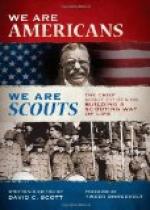We stayed in our camp at the head of the Arkansas river until sometime in April, then we pulled out for Bent’s Fort to dispose of our pelts. We staid at the Fort three days. The day we left the Fort, we met a runner from Col. Freemont with a letter for Carson. Freemont wanted Carson to bring a certain amount of supplies to his camp and then to act as a guide across the mountains to Monterey, California. The particulars of the contract between Freemont and Carson I never knew, but I know this much, that when we got to Freemont’s camp, we found the hardest looking set of men that I ever saw. They had been shut up in camp all winter, and the majority of them had the scurvy, which was brought on by want of exercise and no vegetable food. The most of the supplies we took him were potatoes and onions, and as soon as we arrived in camp the men did not wait to unpack the animals, but would walk up to an animal and tear a hole in a sack and eat the stuff raw the same as if it was apples.
In a few days the men commenced to improve in looks and health. Uncle Kit had them to exercise some every day, and in a short time we were on the road for the Pacific Coast. We had no trouble until we crossed the Main Divide of the Rocky Mountains. It was on a stream called the “Blue,” one of the tributaries of the Colorado river.
We were now in the Ute Indian country, and at this time they were considered one of the most hostile tribes in the west. Of course there was no one in the company that knew what the Ute Indians were but Kit Carson. When we stopped at noon that day Carson told us as we sat eating our luncheon that we were now in the Ute country, and every one of us must keep a look out for himself. He said, “Now, boys, don’t any one of you get a hundred yards away from the rest of the company, for the Utes are like flees liable to jump on you at any time or place.”
That afternoon we ran on a great deal of Indian sign, from the fact that game was plentiful all over the country, and at this time of the year the Indians were on their spring hunt. When we camped for the night, we camped on a small stream where there was but very little timber and no underbrush at all. As soon as the company was settled for the night, Carson and I mounted our horses and took a circle of perhaps a mile or two around the camp. This was to ascertain whether there were any Indians in camp near us. We saw no Indians. We returned to camp thinking we would have no trouble that night, but about sundown, while we were eating supper, all at once their war whoop burst upon us, and fifteen or more Utes came dashing down the hill on their horses. Every man sprang for his gun, in order to give them as warm a reception as possible; nearly every man tried to reach his horse before the Indians got to us, for at that time a man without a horse would have been in a bad fix, for there were no extra horses in the company.
I think this must have been the first time these Utes had ever heard a gun fired, from the fact that as soon as we commenced firing at them, and that was before they could reach us with their arrows, they turned and left as fast as they had come. Consequently we lost no men or horses. We killed five Indians and captured three horses.




